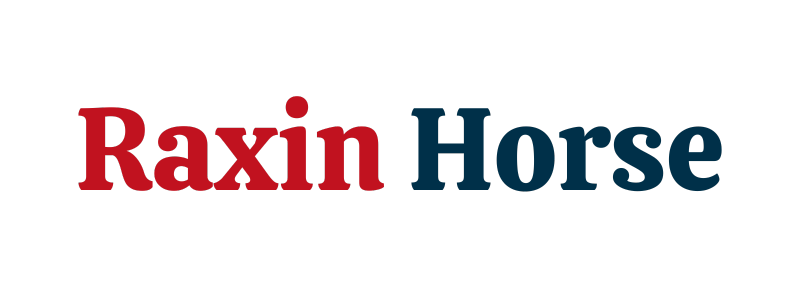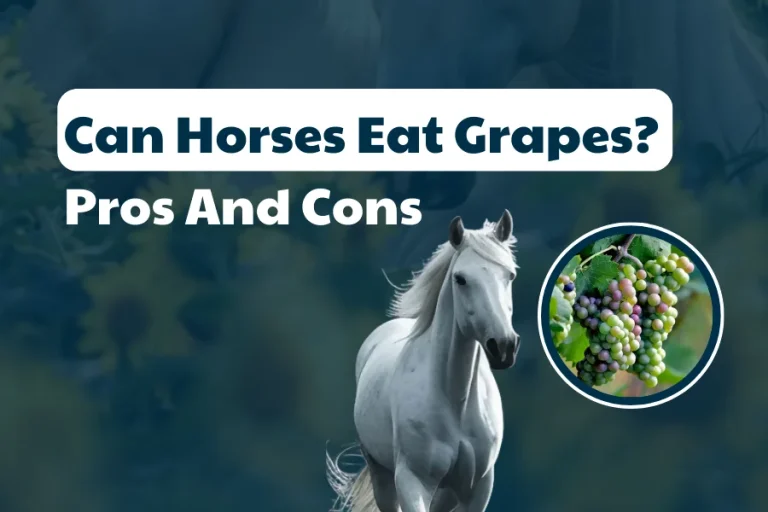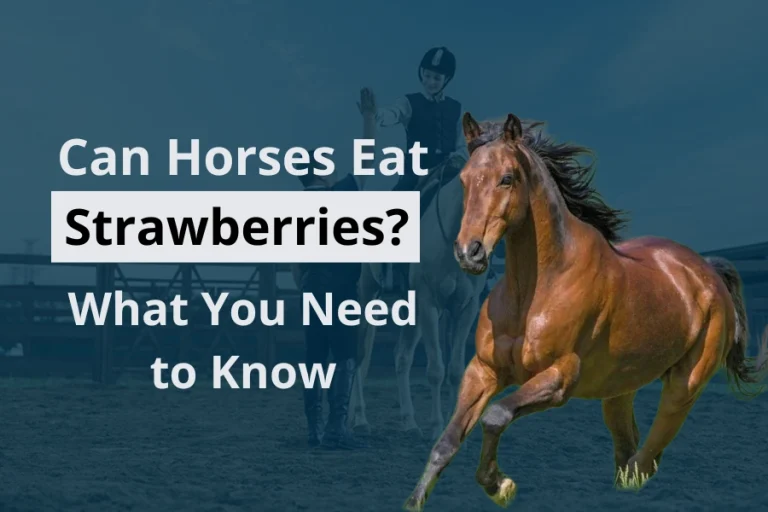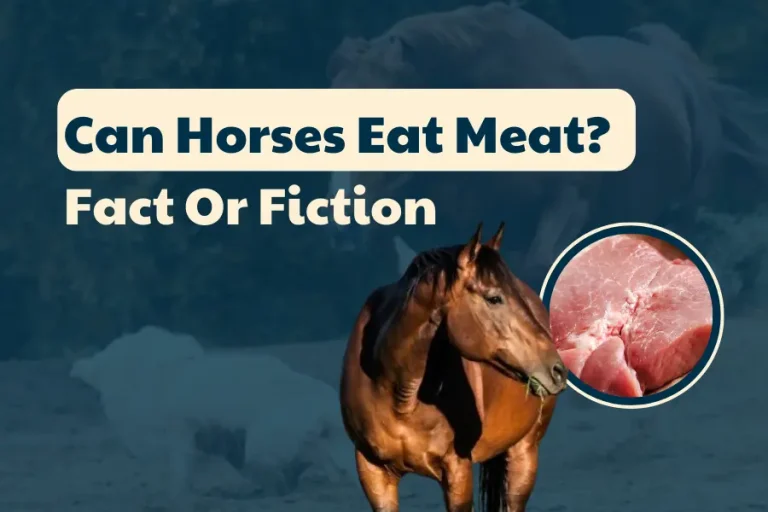Can Horses Eat Bananas? Guide To The Treats Of Horses
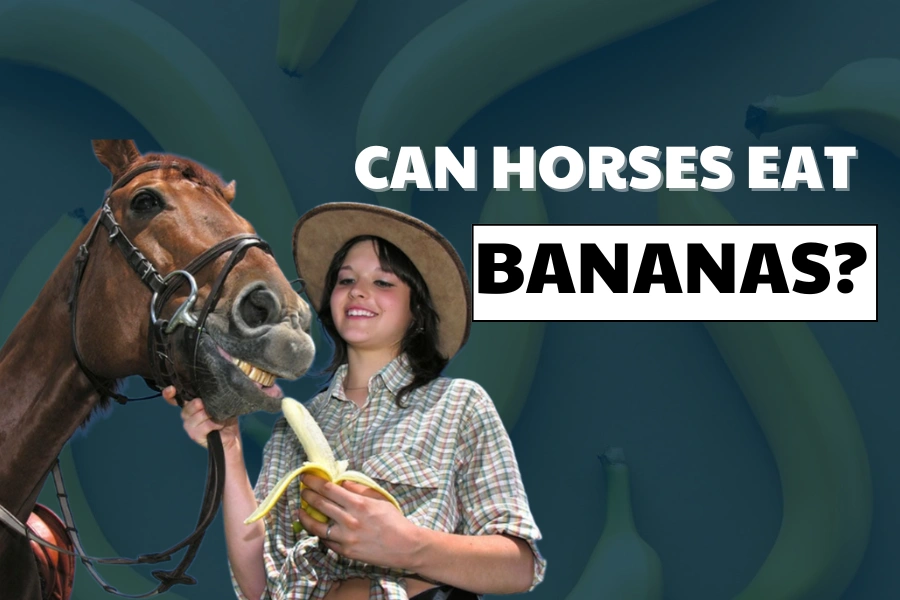
Bananas are a favorite and nutritious dessert for humans. Equine owners may also want to find foods that are safe but also suitable for the taste and health of horses such as: carrots, cucumber,… So can horses eat bananas? is probably a common question among horse owners. The answer to this question is yes. However, not all horses can eat bananas, so owners need to consider nutrition when adding owners to the horse’s diet. In this article, we will look at the nutrients that are good for horses in bananas, the amount of bananas that horses can eat, as well as some benefits and harms if owners feed bananas to horses.
Can Horses Eat Bananas?
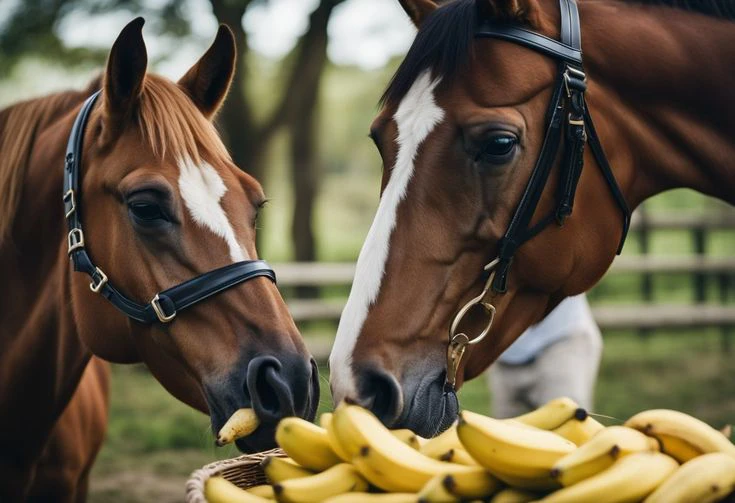
Yes, horses can eat bananas. But equine lovers are never satisfied with just asking can horses eat bananas, they often want to know more about this delicacy. So if you have questions similar to the ones below, then you have come to the right place.
Can Horses Eat Green Bananas?
To be honest, no, horses, which have insulin resistance, should not eat green bananas. Because green bananas contain resistant starch that doesn’t break down into simple sugars in the small intestine and can cause insulin spikes when eaten. So especially, for the horses with hyperkalemic periodic paralysis (HYPP), a genetic disease that makes them sensitive to potassium. High potassium levels can cause muscle spasms and trembling, so horses with HYPP should avoid bananas.
However, although there is no clear research on green bananas treating stomach ulcers, green bananas also recover cells and tissues in the digestive tract after damage caused by ulcers.
Can Horses Eat Banana Peel?
Actually yes, horses can eat banana peel. It is recommended to peel bananas before feeding them to horses. While the peel itself isn’t poisonous, it is hard to digest and can pose a choking risk. Removing the peel also helps lower potential pesticide residue.
Can Horses Eat Dried Banana Chips?
No, horses should not eat dried banana chips because dried banana chips are small crumbs that can cause choking for horses. Furthermore, the process of drying bananas declines in most nutritional value in bananas. So fresh bananas are always the most perfect for treats to horses.
Do Owners Need To Peel Bananas Before Feeding Horses?
Yes, owners should peel bananas before feeding horses. Although the peels do not contain any toxic chemicals such as pesticide, they make horses difficult for digesting and risk choking.
Nutritional Value In Bananas
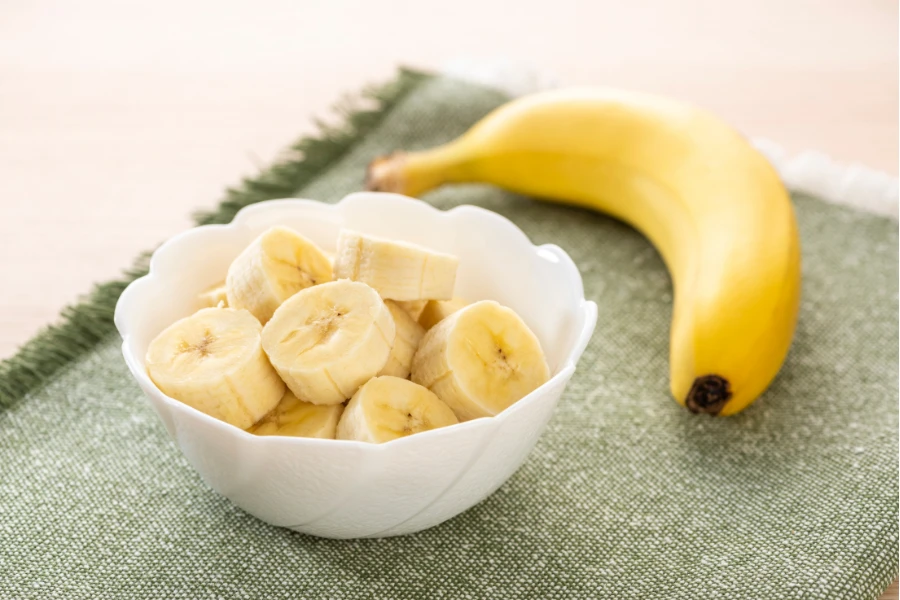
Bananas are known as a nutritious treat that contains a lot of nutrients such as potassium, vitamin C, vitamin B6, and fiber. In addition, bananas also promote immune health, muscle function, and digestion in horses. Bananas are a convenient treat choice for equine owners, so the owners have to know the nutritional value of bananas to calculate the appropriate amount for their horse. Below is the nutritional value for 1 medium-sized ripe banana (100 gram):
| Dietary fiber | 2.6 g |
| Magnesium | 27 mg |
| Polyunsaturated fat | 0.1 g |
| Potassium | 450 mg |
| Protein | 1.1 g |
| Saturated fat | 0.1 g |
| Sodium | 1 mg |
| Sugar | 12 g |
| Vitamin A | 64 IU |
| Vitamin B6 | 0.4 mg |
| Vitamin C | 10.3 mg |
| Total carbohydrates | 23 g |
| Total fat | 0.3 g |
Dietary fiber improves the digestive process smoothly, lowers the risk of stomach problems and supports gastrointestinal health, this mineral can be found in pears and oranges.
Potassium helps horses’ body balance osmotic pressure, which is important for cell function. This component also plays a vital role in balancing electrolytes to regulate nerve and muscle activity.
Vitamin B6 and C are vital minerals for enhancing the immune system and metabolism. Moreover, vitamin B6 supports protein metabolism as well as maintaining and developing muscle. Although horses are able to produce internal vitamin C, some old or stressed horses still need outsources.
On the other hand, sugar in bananas is natural and makes them tasty but if horses absorb too much sugar, they will gain weight and face metabolic issues. Therefore, even bananas are a healthy source of nutrition for horses, the owners have to precisely calculate the frequency and number of eating bananas for the best horses’ diet without any bad effect on horses.
Pros & Cons Of Feeding Bananas To Horse
Now you know that horses can eat bananas safely. However, there are some pros and cons to note about these sweet treat.
Pros Of Feeding Bananas To Horse
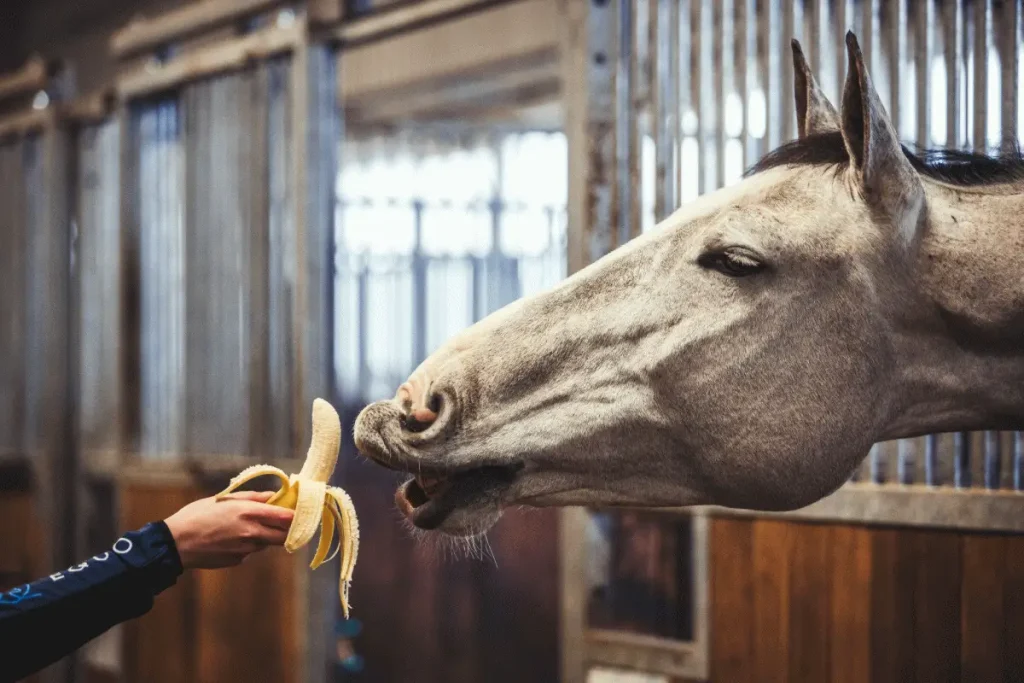
Without a doubt, bananas are good for horses in many ways when you add sensibly to a horse’s diet. Here are some main benefits:
Good supply of vitamins and minerals: Bananas are rich in vitamins and minerals. For example, 100 grams of bananas contain 64 IU Vitamin A, 0.4mg Vitamin B6 and 10.3mg Vitamin C. Vitamin B6 which is known to help in the conversion of proteins and fats while Vitamin C is a powerful antioxidant that enhances the body’s immune system. In addition, bananas are high in potassium and magnesium, which are useful for the nervous system, muscular structure and for the cardiovascular system also.
Offer a quick energy: For this reason, high natural sugars in bananas makes it possible for horses eating bananas to recover quickly especially after training or competitions.
Digestive support: Although bananas are not the ideal source of fiber for the digestive system of a horse, they still give some fiber support for digestion. Moreover, it has been suggested that bananas may have a role in reducing gastric ulcers and protecting the mucous membrane in horses because of protective phospholipids. Bananas contain pectin, a type of soluble fiber that can form a protective layer in the stomach, potentially minimizing the contact of stomach lining with stomach acid. While this is not as supported by science as one might like to see, consuming bananas within a reasonable portion can significantly improve the health and well-being of horses.
Cons Of Feeding Bananas To Horse
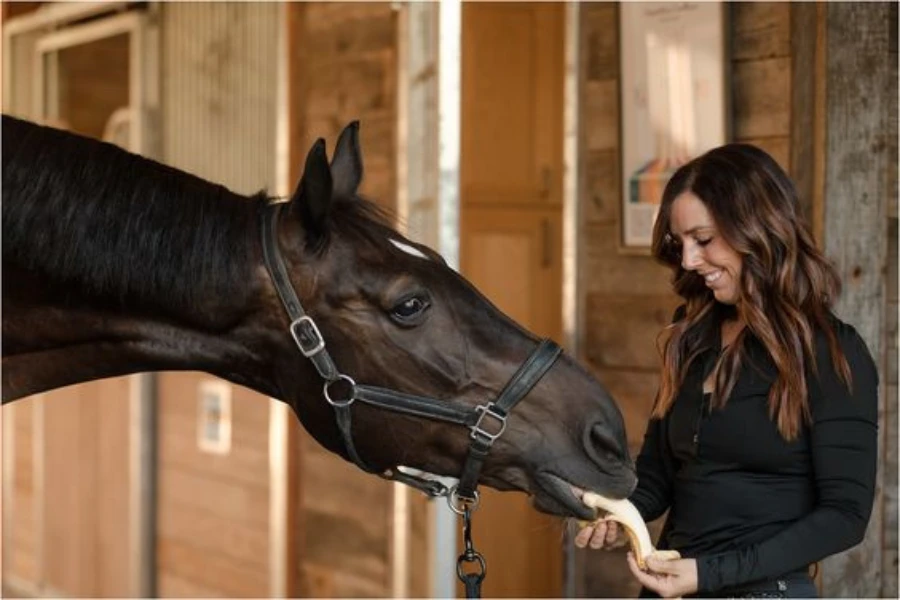
Even though bananas offer nutritional benefits for horses, it is not free from downside, so owners should be careful of these dangers to ensure their animals enjoy this treat safely.
High sugar content: Like watermelon, apples or strawberries, banana is a fruit which is high in sugars in its natural state. In fact, a medium-sized banana, which can be about 100 grams, can contain as much as 12-14 grams of sugar. For humans, high natural sugar in bananas provides a quick source of energy, while for humans, it can cause some potential problems. For example, if horses consume too much sugar, they may develop conditions like obesity or even diabetes. This causes inflammation or other problems related to insulin since blood sugar rises at a high rate in the bloodstream. Therefore, horse owners should be careful in feeding bananas to horses with health issues like hoof inflammation, insulin resistance, obesity, or those that are less active.
Digestive issue: Bananas themselves and digestive system of a horse are the two main causes because of which a horse which eats banana is likely to suffer from a digestive issue. The digestive system of the horse is designed to digest high fiber diets such as grasses and hay and not fruits particularly bananas with high sugar content.
Pesticide residue: Although it’s good to feed bananas to horses, the horse owners should be cautious with the amount of pesticides which they feed to their horses because bananas are normally treated with chemicals to control pests and diseases. In case the bananas are not washed or peeled, horses may consume a lot of pesticides which leads to either poisoning or digestive problems. Therefore, to ensure the safety of horses, bananas should be thoroughly washed and peeled before feeding.
Choking hazards: Many bananas at a time or whole bananas can make it difficult for them to chew and swallow, especially for older horses, those with dental issues, or horses that tend to eat quickly. As a result, your horses can likely be choking like eating celery, cucumbers and even bread.
Feeding Suggestions And Best Practices
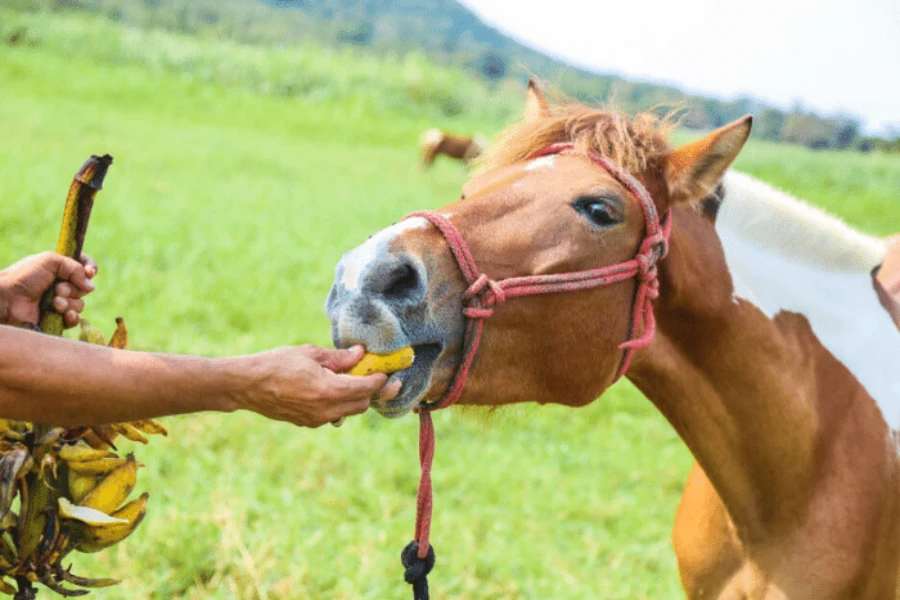
There is no clear research on how many bananas a horse can eat. However, horse owners advise that horses should eat no more than 2 bananas a week, and 1 or 2 bananas at a time. If horses eat more than that frequency and quantity, it may lead to stomach ache.
First of all, when feeding your horse any treats besides bananas, such as apples, pears, etc, the owners should introduce them gradually. Feeding them too many bananas or any sweet snack at the first time may result in horse colic due to their sensitive stomach.
Secondly, horse owners need to keep a close eye on their horse’s sugar intake, otherwise they can gain weight and have other health problems. Despite rare cases, horses are allergic to bananas. It is important to monitor for any bad reactions of the horses. Additionally, horses with HYPP, a genetic disorder affecting potassium levels, must not consume bananas to prevent potentially health crises. It is not only for bananas but also other potassium-rich and high in sugar content foods such as pumpkins, beet molasses, and sugar molasses.
Thirdly, bananas also contain starch and pectin. So if your horse consumes too much pectin, they will become constipated because the pectin draws water from the intestines. Also, too much starch can be difficult to digest.
Last but not least, in addition to broccoli supporting dental problems, owners can feed bananas to the horses by pulping them, chopping them up or adding them to mashed horse feed. If the horses are picky eaters, frozen bananas are a great way to add to their food. If the horses are sweet tooth, owners should feed mashed fresh bananas to reduce the risk of choking. Horses should have a diet that consists of hay or grass. Even bananas are healthy but they should be a supplement to this diet.
Conclusion
After reading this article, equine enthusiasts and owners already had the answer for the question: can horses eat bananas? Bananas are a healthy treat providing nutrition and essential minerals, so horses can enjoy it as a flavor treat, but it is crucial for owners to feed them responsibly. By following the guidelines provided, such as removing the peel, feeding it in control, and ensuring they’re ripe and free from pesticides, owners can safely incorporate bananas into their horse’s diet.
Keep in mind that moderation is key to lowering the potential risks like choking hazards or digestive issues. It’s necessary that by following the advice above, horse owners can offer bananas as a healthy, enjoyable treat, ensuring their equine friends benefit from this nutritious snack while maintaining overall well-being.
